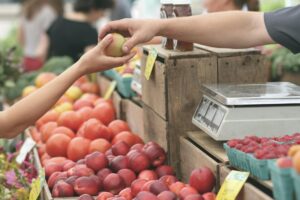
Whether it be the weekly food shop or a huge clothing spree, online shopping is becoming the new normal. With many of us juggling busy schedules and the accessibility of time-slotted supermarket deliveries, this trend hardly comes as a surprise.
For many, the ritual of food shopping in their chosen supermarket is a sacred routine and cherished tradition. This can be said especially for the older generation, who recall pushing the trolley alongside their parents and later sharing the same experience with their children.
The supermarket can be someone’s third place – a space away from home and work where socialisation and relaxation intertwine.
This is the case for my great-grandma (Gran) and me. For the past three years, we have done my Gran’s weekly shop at Morrisons every Monday morning. For an hour or so, we work through her crumpled and yellowed list, written faintly on a worn envelope, to shop for her essential items.
This experience allows us to spend precious time together and ensures that my Gran still feels involved in her local community and society as a whole.
Familiarity and Routine
An essential aspect of the third place is familiarity, and the supermarket provides a sense of this. Whilst a change of scenery from our homes and workplaces is key, the third place needs to feel familiar and reliable to ensure our return.
A third place serves as an excuse to dress for the occasion, but the familiarity and routine mean we can relax in this environment. We know what to expect, and nothing is demanded from us, unlike the expectations that loom at home or work.
Morrisons has always been my Gran’s first-choice supermarket, even during her various moves over the years. Whilst each store is different, the layouts and designs are often extremely similar. Every week we meander through the aisles with ease, knowing where to find anything we need, although it is not common that we need anything straying from the trusty list.
This allows for a sense of control, which can be important as we need to know that our visit will evoke a certain feeling or fulfil a specific need.
Fostering Relationships
As well as being familiar with the aisles and products, we see a lot of the same staff each week. People and relationships in a third place are vital to the experience.
The seemingly casual conversations with the checkout assistants can be significant for both parties. My Gran has her favourite checkout workers, and I’m sure they have their own favourite customers too. Small talk can foster communication skills, as well as create a warm and light atmosphere to help people feel seen and valued, even in fleeting exchanges.
Monday-morning shoppers are creatures of habit; we spot the same faces each week. Knowing that each shopper has their own life yet is there every Monday to do their food shop underscores the human experience. The small things in life are still important, as much as we get caught up in the big life events. Routine activities help keep us grounded and present.
Community means a lot to people, especially the older generation. Feeling needed and being seen as contributing provides satisfaction. While chatting with staff members and customers can be part of this, for some people, shopping without interacting can still make them feel involved. Third places can allow for independence without the burden of loneliness.
Changes
Despite the comfort of familiarity, third places are always subject to change.
In the case of the supermarket: refurbishments can occur, aisles can change, and products can be repackaged. Similarly, staff can come and go quite regularly. These changes can be unsettling to someone who values routine and familiarity, but we can find positives in them.
For people who may not venture out as much, particularly the elderly, changes can be stimulating and thought-provoking. They provide opportunities for conversations and questions.
When products are shifted around, my Gran and I must look in different places. In the process, we often find other treasures such as the Walkers Heinz Beanz-flavoured crisps we discovered a few weeks ago, or the Oreo-flavoured Coca-Cola that my Gran turned her nose up at.
Supermarkets, as third places, act as cultural crossroads where different experiences and ideas merge. This is thought-provoking and allows my Gran and me, for instance, to learn from each other.
Younger and Older Generations
We all need and look for third places, yet I believe the older generation shaped the culture around them.
With the emergence of the 9-to-5 working routine in the 1920s, it became essential for people to have somewhere to socialise and relax outside of home and work. This could be a café, a park, a church, or a sporting league.
As people age, it becomes less common for them to perhaps want or be able to venture out. So, a supermarket makes the perfect third place, where an essential task becomes a social outing.
Younger people have a wider range of social activities to choose from, and they also tend to travel more. This fast-paced way of living leaves little room for a third place to be routinely visited. This would be the case for me if not for shopping with my Gran. Whilst I mostly do it to help her and spend time with her, it is also good for me to have somewhere familiar. Routine helps keep me on track and grounded.
A lot of people strive to get away from their hometown or local community nowadays, as it is seen as broadening their perspectives. However, I think it can also be rewarding to continue to support your local community. There is a lot to learn in this world, but some of that information can be right under your nose.
Supermarkets, as third places, promise routine and familiarity while also providing essential social interactions. For the older generation, it can be the highlight of their week – a chance to remain part of their community and stimulate their minds. For younger people, it can provide structure for the week and keep them present amid the busy hustle culture.
Perhaps you should consider shopping in person more often, schedule-permitting. You could even accompany your parents or grandparents on their weekly shop, discovering the value of connection and familiarity.



Comments